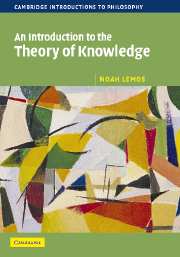Book contents
- Frontmatter
- Contents
- Preface
- 1 Knowledge, truth, and justification
- 2 The traditional analysis and the Gettier problem
- 3 Foundationalism
- 4 The coherence theory of justification
- 5 Reliabilism and virtue epistemology
- 6 Internalism, externalism, and epistemic circularity
- 7 Skepticism
- 8 The problem of the criterion
- 9 The a priori
- 10 Naturalized epistemology
- Select bibliography
- Index
1 - Knowledge, truth, and justification
- Frontmatter
- Contents
- Preface
- 1 Knowledge, truth, and justification
- 2 The traditional analysis and the Gettier problem
- 3 Foundationalism
- 4 The coherence theory of justification
- 5 Reliabilism and virtue epistemology
- 6 Internalism, externalism, and epistemic circularity
- 7 Skepticism
- 8 The problem of the criterion
- 9 The a priori
- 10 Naturalized epistemology
- Select bibliography
- Index
Summary
Epistemology, or the theory of knowledge, is concerned with a variety of questions about knowledge and related topics. Certainly one of the most important questions is “What is the extent of our knowledge?” Some philosophers, especially those in the “common sense” tradition, would say that we know pretty much those things that we ordinarily think we know. They would tell us, for example, that we know that there are other people, that they think and feel, that we were alive yesterday, that there are cars and dogs, and so on. They would tell us that we know a lot about our immediate physical surroundings, other people, and the past. Others would add that we know various ethical and moral truths and some would also say that they know various truths about God and God's attitude toward mankind. Still other philosophers, influenced by various forms of skepticism, would say that we know much less than any of this, and the most extreme skeptics would say that we really know nothing at all.
Evaluating these views is no easy matter, and when we reflect on them, and the reasons advanced in favor of them, we are soon led to other questions about knowledge. Such reflection might naturally lead us to ask one of the most important and oldest epistemological questions, “What is knowledge?” Over two millennia ago, Plato wrestled with it in his dialogue, Theaetetus. Plato sought a definition of knowledge, but came to no clear answer and the dialogue ended inconclusively.
Information
- Type
- Chapter
- Information
- An Introduction to the Theory of Knowledge , pp. 1 - 21Publisher: Cambridge University PressPrint publication year: 2007
